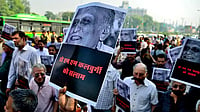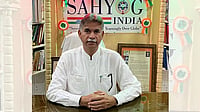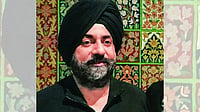Gurbaksh Singh (name changed) was dressed in rags that stank when he was brought to the sprawling headquarters of NGO Manukhta Di Sewa on Ferozepur Road in village Hassanpur of Punjab’s Ludhiana district. A homeless man in his early 60s, Gurbaksh sported an untidy beard and matted hair. Before he was brought here, passersby would turn their gaze away after catching sight of him.
Today, his hair is cleaned meticulously, nails trimmed and he sports a bathed look in new clothes. Amid recitations of “Satnam Shri Waaheguru”, a saffron turban is wrapped around his head. In his new avatar, Gurbaksh looks like any other man, a little depressed though. Those who brought him to Supney Da Ghar (House of Dreams)—a shelter home for such people here—narrate his story: Almost 40 years ago, the wedding ceremony of both Gurbaksh and his brother was scheduled for the same day. On the day of the marriage, he was sent for sweets. The market is about 20 km from their home and therefore, his return took a little longer than expected. By the time he reached home, an important wedding ritual had already been conducted. Furious, he left home and never returned.
He didn’t get married and started living like a destitute. “In the past 25-30 years, he has been given a bath only six times on election days,” says Gurpreet Singh, who once ran an eatery on rent along G.T. Road at Doraha. “We’re grateful to politicians for their empathy during polls.” Almost on a daily basis, such abandoned and mentally ill patients are brought to the NGO’s headquarters, which is run by over 250 volunteers. Besides balanced diet, routine health check-up and medicines, these volunteers take care of all their basic needs.
The AC dormitories house about 200 male and about 50 female patients, mostly suffering from mental, physical and emotional issues. Many inmates here include the ones who had been earlier held captive for several decades or even tied with chains to trees.
Almost twice a week, medical camps are organised, in which hundreds of attendees turn up. While the visitors are served meals, those who come from remote areas are provided accommodation as well. At Supney Da Ghar, we meet about half-a-dozen children with special needs, who had been abandoned by their parents when the latter remarried. They have been brought here by their grandparents. The organisation also runs a boarding school for destitute children. We also meet orphans who had been living like beggars.
The vast number of psychiatric patients coming to the NGO also indicates Punjab’s growing mental healthcare crisis. According to observers, the state government has almost withdrawn from the healthcare sector whereas the poor find it almost impossible to get medical treatment at the private hospitals.
Gurpreet, the founding president of the NGO, had first nursed a young paralytic man who had collapsed in front of the dhaba in May 2016. After a few days, the young man said his name was Arun Kumar Shukla. When his photos were shared on Facebook, his brother came to see him. Sadly, he refused to take Shukla back home.
Acknowledging the power of social media for uncovering the hypocrisy of society and administration, Gurpreet says, “With the passage of time such posts touched the compassionate hearts across India. We started receiving messages and calls from other cities and states about the unidentified, miserable, mentally challenged people and those with wounds being eaten away by maggots. Generally, doctors refuse to treat such patients in most of the hospitals.”
But on seeing all this, Gurpreet recalls, the landlord of his dhaba asked them to leave the place. This is when he and his friends shifted the people under their care and protection to an adjoining village. Tents were pitched on the land of a friend and a makeshift nursing home for the destitute came into existence within no time. And meanwhile, the construction of Supney Da Ghar was in full swing on Gurpreet’s farm land at Hassanpur village. They started shifting inmates to Hassanpur by the end of 2019.
Maintaining that many inmates have been reunited with their families thanks to social media, Gurpreet says, “There can’t be a bigger satisfaction than seeing smiles back on the faces of the people we serve here at Manukhta Di Sewa.”
(This appeared in the print edition as "The Healer")
Liked the story? Do you or your friends have a similar story to share about 'ordinary' Indians making a difference to the community? Write to us. If your story is as compelling, we'll feature it online. Click here to submit.


























